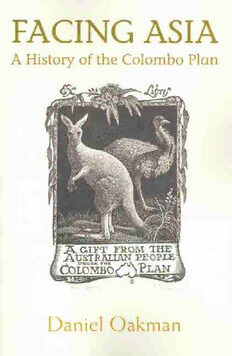
Facing Asia: A History of the Colombo Plan PDF
339 Pages·2006·2.309 MB·English
Most books are stored in the elastic cloud where traffic is expensive. For this reason, we have a limit on daily download.
Preview Facing Asia: A History of the Colombo Plan
Description:
Shortlisted for the 2005 NSW Premier's History Awards.State Records NSW - John and Patricia Ward History Prize ($15,000)The Colombo Plan is the world's longest-running bi-lateral aid programme. Devised in the 1950s as part of the British Commonwealth's campaign against the spread of communism in Asia, it came to symbolise the Asian students who were arriving in increasing numbers to study at Australian universities. Daniel Oakman's book details the history of the Plan from its conception. He demonstrates its strategic, economic and cultural reach, while analysing both its effectiveness and Australia's very mixed intentions at the time. Oakman shows that the Colombo Plan was used as much to promote Australia in Asia, as to assist Asian economic development or help Australians to understand Asia. His perspective on Australian foreign policy in the immediate post-World War II period adds a new dimension to post-colonialism and European retreat, and offers an opportunity to re-evaluate the work especially of Percy Spender who was Minister for External Affairs when the plan was first conceived, and Richard Casey who actively pushed it along. The book is based on a close reading of Australian official sources, a sampling of external sources, and some oral interviews with bureaucrats and politicians involved, as well as a study of their private papers. Oakman's use of correspondence by and about the students in Australia, interviews, and press reports of their experiences shows the extreme care taken by the authorities not to challenge the prevailing white Australia policy by discouraging any disruptive behaviour among the students. One of the unintended consequences of the hospitality and friendship offered to Colombo Plan students was that occasionally students fell in love with Australians and decided to marry, raising official difficulties, some of which are recounted here. Oakman has managed to transform what at first sight might seem a rather dry subject into one of considerable insight into the history of the white Australia policy and Australian attitudes to Asia. null
See more
The list of books you might like
Most books are stored in the elastic cloud where traffic is expensive. For this reason, we have a limit on daily download.
